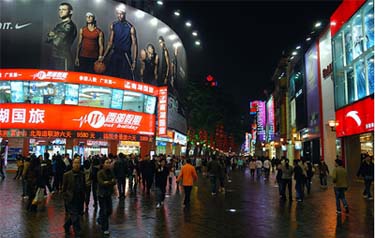Here we offer a primer on what foreign businessmen need to know about China. Some crucial advice was given by Peter Phillips, Director (Asia) for the Canberra lobbying firm Government Relations Australia. Phillips is a Chinese linguist and a former diplomat and China intelligence analyst for the Office of National Assessments.
Learn the language, Phillips says. Make sure you understand the Chinese system and how power works—and know where the people to whom you are talking fit into the political and economic structure. That may seem self-evident, but it can be costly and potentially dangerous not to do so.
The detention of Stern Hu suggests that even those who possess linguistic skills and cultural understanding are at risk when China decides to throw its weight around. A telling context for the affair was China’s attempts to force the Melbourne international film festival and the National Press Club to suppress the views of Uighur leader Rebiya Kadeer.
It is worth noting that there are now 206,590 people of Chinese ethnicity in Australia; last year the number of Chinese visitors to Australia exceeded 350,000. Most are doubtless entirely reputable—but four years ago two defecting Chinese diplomats, Chen Yonglin and Hao Fengjun , claimed there were ‘thousands of Chinese spies’ in Australia. Reports from the US, UK, Germany and Canada have revealed widespread and costly Chinese espionage operations. In Australia since the end of the Cold War, ASIO has seen its counter-espionage skills greatly diminished.
There are certain abiding truths about doing business with the Chinese Government. First, China is not a democracy and it does not remotely resemble the sort of rules-based political environment Western businessmen are accustomed to. The People’s Republic of China is an authoritarian state in which the Communist Party holds absolute political power and will brook no opposition.
Second, there is no separation of the power of the Communist party from the judiciary or from those who hold high government and commercial positions. On the contrary, the Party appoints the judges, runs the military and security organs, and places its loyal apparatchiks into every position of authority throughout the country.
Third, the relationship between the Communist Party and the 2 million–strong People’s Liberation Army is seamless. In China the most powerful position in the country is not President or even General Secretary of the Party; it is Chairman of the Central Military Commission. Business travelers to China need to be acutely aware of the importance of the military and intelligence agencies in China, and that doing business with them risks being accused of betraying state secrets.
Fourth, the Chinese Embassy in Canberra and its consulates in capital cities are actively involved in intelligence gathering. When you visit the embassy you risk having your every word recorded and when you visit China it is common practice for Chinese intelligence to bug your hotel rooms. You need to be alert to the danger that behaviour which we consider to be within normal commercial practices may be viewed as compromising state economic secrets in China.
Fifth, locally engaged staff in China will be expected to deliver intelligence on your operations to the authorities if your business is perceived to be sensitive to Beijing’s broad definition of ‘national security’. For them to refuse would put at risk not only their careers but the well-being of their families.
Sixth, Beijing is not reticent about using its diaspora of overseas Chinese. In a recent speech in Beijing, Politburo member Wang Zhaoguo exhorted the Eighth National Congress of Returned Overseas Chinese to do more to unite the broad masses of overseas Chinese, their relatives, and overseas Chinese nationals ‘to participate in and provide support for socialist revolution, construction and reform’ in the motherland. He said this required the unremitting efforts of all sons and daughters of the Chinese nation to make China prosperous and strong.
So Australian businesses need to be alert to the danger of Chinese employees in Australia with relatives in China coming under pressure to provide information in the interests of their country of birth. And when they visit China every person of Chinese ethnic origin will be of interest to Chinese intelligence and may be approached. If they refuse to help, their future trips to China and their relatives resident in China might be compromised.
A key lesson from the Stern Hu incident is that there should be no illusions in the minds of foreigners that China will act to protect what it sees as its vital identity — particularly against ethnic Chinese, whether or not they carry an overseas passport. Peter Phillips advises foreign businessmen to beware of being compromised when offered hospitality or gifts in China. If there is no danger of compromise, there is no problem with accepting hospitality or gifts.
Foreigners should also be aware that China believes the world owes it a favor. Having been one of the world’s most imposing economies until the 1830s, China is now roaring back into prominence. Consequenly, China regards it as vital that the Middle Kingdom resume its place as a lofty and majestic world civilization superior to most other cultures.
There is an ancient Chinese predisposition to regard all non-Chinese as barbarians and to be concerned about what Chinese officials have called ‘spiritual pollution’. That may be Stern Hu’s real offence. If so, he is essentially a pawn in China’s pursuit of historic greatness and Beijing will remain blind and deaf to concerns about its violations of his basic human rights.
This article originally appeared in the Australian Financial Review on August 13.
Paul Dibb, Professor Emeritus at the Strategic and Defence Studies Centre (SDSC) at the Australian National University, was a senior intelligence officer who opened defence intelligence relations with China in 1978. Geoffrey Barker is a visiting fellow at the SDSC.


Excellent summary on the subject. I found this paper, Doing business in China : A risk analysis http://digitalcommons.kennesaw.edu/cgi/viewcontent.cgi?article=1006&context=jekem discussing these ideas in greater detail